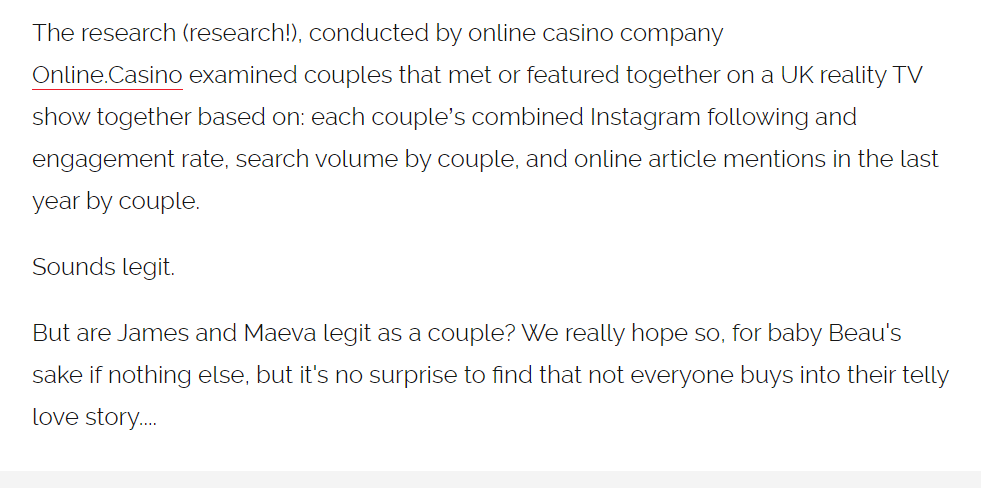The work of journalists across Europe is complex. As most media face a barrage of information, much of it difficult to verify, press releases represent an important source of information to inform local reporting. Unfortunately, these communications can often be used to mislead or secretly promote morally dubious companies and interests.
In PR-speak, “newsjacking” is the art of inserting a company within a news story to create the best possible exposure for their brand. In many instances, this is done seamlessly by PR companies. For example, a PR release about data on the cost of living will be sent to media outlets, appearing to feature the analysis of an online price comparison website and its founder.
Usually, both the research and comment are not from the online company, but rather a PR firm, charged with promoting the company brand through the media. This is an age-old practice, which powers much of modern journalism. However, increased profit-motive, and dwindling journalist resources, are seeing this practice subverted, notably on behalf of the gambling industry.
According to research conducted by The Brussels Times, many PR companies are now dedicating vast resources towards helping to promote gambling services in major media publications across the world. Many PR agencies are not transparent about what clients they work with. Nevertheless, some proudly feature articles that they have placed with major international media organisations.
One UK-based PR company, Search Intelligence, between 22 April and 22 March, says on its website that it successfully placed 233 stories with media across the world. Of these stories, the largest share (28%), were on behalf of gambling sites and gambling-related services.
Industry experts told The Brussels Times that these companies were not the only ones engaging with the gambling industry, pointing to others who were less transparent about their clients. Indeed, such agencies can easily be found online. Gambling companies are big spenders and rely on link building, increasing the number of external links pointing towards their websites, to improve their search engine rankings.
One British PR specialist, who wished to remain anonymous, stated that some of the tactics used by these companies are morally dubious. Gambling advertisement is tightly regulated across the EU and the UK.
“I don’t think these [companies] are doing anything illegal, but it’s more… immoral. They work on a ‘spray and pray’ principle… They just make a commission for referring a user to them,” the experienced PR expert said. The Brussels Times receives several of these press releases per day. Some tailored to Belgium, and most link to gambling, crypto, investing, and other suspect industries.
Clicks for spins
PR company owner, Fery Kaszoni, Managing Director at Search Intelligence, agreed to talk about his gambling clients. Other PR companies contacted by The Brussels Times declined to comment.
Kaszoni says that his company was certainly not alone in its links with the gambling industry. His company hires over a dozen staff, which the company’s website refers to as “journalists”, who create research on behalf of clients, which are then sent to media publications. Kaszoni and his employees have successfully landed stories in Bloomberg, Forbes, the Evening Standard, and other top-shelf media.
“We set up our company to be the research department of journalism. That’s the philosophy. We are not even an PR company, in our minds. We are a research company that helps journalists with interesting insights,” Kaszoni said. The company says that it trains its employees as data journalists, primarily using Google Trends data, and teaches them to verify their information.
There are very few types of clients that Search Intelligence will not accept. Only pornography appears to be taboo. “We don’t accept anything that’s illegal. We don’t accept guns and so on.”
The company boss admits that his company works with many “gambling affiliate sites”. Kaszoni is audibly uncomfortable talking about these clients. Most of these companies are legally registered as advertising firms, accepting referral commissions from casinos. Despite this, they are typically framed as “review sites.”
Some articles placed by Search Intelligence for these clients, as well as by other “reactive” PR agencies, certainly raise some eyebrows.
Gambling links are frequently placed on youth-oriented websites. For example, links to gambling and gambling-related services are placed in video games publications, pop-culture articles, and celebrity gossip news sites. PR companies agree on quotas for the amount of traffic they can drive to their client's site.

Research commissioned by gambling sites is often included on celebrity news sites, local media, and gossip sites. The stories often piggyback on the success of TV shows and video games, many of which are popular with young people. Credit: The Brussels Times
The Search Intelligence PR executive admitted that his company might have “some role” in promoting gambling companies. “I mean… It's not illegal. We would definitely not promote anything illegal or unethical,” he defended. Unwitting media publications may publish stories commissioned by the gambling industry. This includes some of the biggest names in media (and even The Brussels Times, which has since removed the offending articles.)
Some PR agencies openly state on their website that they work extensively with gambling clients. Others do not post such information, instead opting to keep their work with the industry quiet.
Grey area
Indeed, countries across Europe have significantly boosted their legislation in recent years to protect vulnerable groups from gambling companies. The UK Gambling Commission commented on The Brussels Times' findings, noting that some promotions do run foul of the gambling advertising watchdog. Strict rules are placed on the advertising of gambling, written by the UK Committees of Advertising Practice (CAP) and enforced by the Advertising Standards Authority (ASA).
“The rules are designed to ensure that marketing communications for gambling products are socially responsible, with particular regard to the need to protect children, young persons under 18, and other vulnerable persons from being harmed or exploited by advertising that features or promotes gambling,” a spokesperson said.
The Commission is aware of the use of PR agencies to promote the gambling industry. UK companies are leaders in PR services, and promote brands internationally. Search Intelligence placed articles in Belgium, France, Brazil, USA, Russia, New Zealand, Pakistan, Ghana, Brazil, Ireland, and others.
“The rules apply to the promoted business and the marketing affiliate… We work very closely with the ASA and if gambling firms break those rules, we can take tough action, including fining the offending firm,” the Gambling Commission reminded.
Beyond gambling
PR campaigns use even more questionable tactics for different sectors. One story about European health statistics, picked up by numerous media outlets including UK-based Daily Express, linked directly to a German powdered tobacco store. The press release for this story even suggested that the relative health of Scandinavian nations could be explained by these nations’ preference for snus over traditional tobacco.
“Yeah I think this is more borderline… It’s hard to make everything perfect,” Kaszoni grimaced. While Kaszoni’s company is definitely not the worst offender in the PR market, it has received the lion’s share of criticism online, partly due to its relative transparency.
It frames its PR as “data journalism” and contacts journalists under the name “Journoresearch.org”. Org domains are typically reserved for non-profit organisations. One online commentator said that this gave a misleading impression that the data had come from “another journalist or official organisation.”
This tactic is used by numerous digital PR companies. Not only are their tactics called into question, so too is the research. Some have even called the research sent to the media by the companies “fake news.”
Last year, SEO consultant Christopher Bryne challenged some of the research created by Search Intelligence. He alleged that the Google Trends data journalism produced by the company often misinterpreted the data or misconstrued the larger picture.
Belgian advertising ban and ambiguities
PR companies accepting commissions from gambling companies may soon find themselves in hot water. Their spray-and-pray tactics, sending stories to media across the world, may be done in ignorance of national legislation. Despite this, some loopholes still allow gambling sites to attract new audiences through media organisations.
In Belgium, a comprehensive ban on gambling advertising is set to come into force from 1 July. According to the stipulations, advertising on websites and social media platforms will be prohibited, based upon “strict ethical and formal rules.”
On the basis of an opinion given by the Council of State, SPF Justice notes that “an interview (many placed stories feature ‘interviews’ with the gambling company -ed.) with a [gambling] licensee is not considered as advertising, unless in said interview the licensee promotes games of chance and/or encourages consumers to gamble.”
The Royal Decree on the upcoming gambling advertising ban admits that clarification is needed for the Belgian government’s definition of “advertising”, notably for “communications that promote gaming products and the image of the licensee, as well as communications intended to induce players to play.”
“[Gambling advertising] can, for example, also be image advertisements that do not advertise specific products and whose sole purpose is to project a positive image of gambling operators and gambling in general,” the Royal Decree notes.
UPDATE: The SPF Justice has responded to The Brussels Times' request for comment. Indeed, PR companies may soon find themselves on the wrong side of the law.
"Advertising is any form of communication that directly or indirectly promotes gambling or induces people to gamble, regardless of the place, means of communication or techniques used. Publishing a direct link to a web page offering games of chance is therefore intended to direct people to this page, and thus, incite them to play," a spokesperson for SPF Justice said.
Pushed for further comment, the Belgian justice department confirmed that "casino review sites" would also be in violation of the new comprehensive rules. Both news media, PR companies, and their clients could be slapped with fines of up to €200,000 for failure to abide by this new law.
Furthermore, media that have previously posted these links, of which there are many, will also be in infraction of the gambling advertising ban. This leaves PR companies and media organisations open to hefty fines if they do not remove the offending links before July.
Belgium has blazed a trail in terms of its complete ban on gambling advertising and other countries may follow in its footsteps. Within the EU, bans on online gambling advertising exist exclusively in Italy, Belgium, and Germany. Others may follow suit.
PR experts argue that the links are not necessarily advertisement, but just link building, comparing it to simply placing a link on Google. Nevertheless, these clicks still generate money for both the gambling sector and leading PR companies.
“A large part of our clients are gambling affiliate companies who just make affiliate money… People might click on the link to see who’s done the research but I don’t think many will actually convert into gambling addicts,” Kaszoni concluded.

